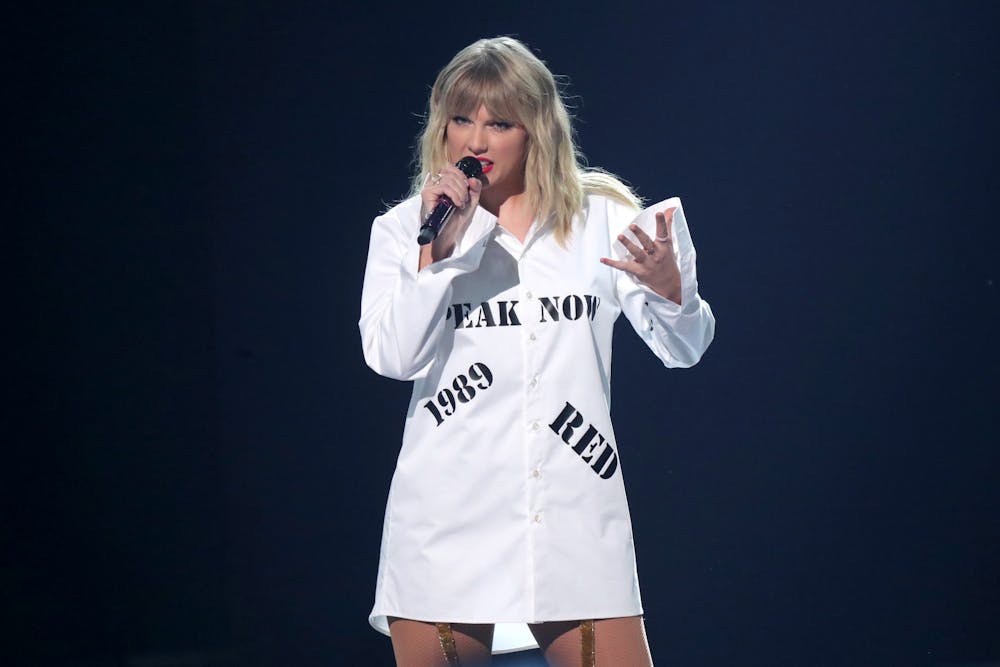Wearing a men’s button-down shirt stamped with the titles of her first seven albums, Taylor Swift kicked off her American Music Awards performance with a reminder that her life’s work belongs to, as she wrote on Tumblr, “men who had no part in creating it.” And flanked by eight young girls wearing shirts identical to hers, Swift sent a message that the female artists of the future are watching.
Ten days before the AMAs, where Swift was honored as Artist of the Decade, she didn’t know if she’d be able to perform a medley of her hit songs as she planned.
In a social media statement, Swift accused music industry tycoon Scooter Braun, who purchased most of Swift’s master recordings in June, and Scott Borchetta, head of her former record label, of prohibiting her from singing the songs on TV that fall under their legal domain.
The statement is the latest in a highly public and messy battle between Swift and Braun and Borchetta.
Swift first alleged in June that she was never given the opportunity to buy her own masters and that the sale of her music transpired in an intentionally underhanded manner. As is customary of public reaction to news involving Taylor Swift, much backlash ensued toward both parties.
But many of Swift’s critics are missing the bigger picture, or rather, the bigger pictures — Swift’s fight for control of her labor-intensive catalogue is an artistic, political and feminist issue all embroiled into one.
Many critiques aimed at Swift were focused on the legalities of her dilemma. She signed a contract, therefore she can’t complain when her music is subsequently commodified, right? But Swift is simply advocating for contractual agreements in which artists retain their autonomy. In fact, the singer has long been promoting the rights of artists, from her open letter to Apple Music, which was posted to her Tumblr but has since been taken down, to her negotiation with Universal Music Group, both of which won fairer pay rates for artists.
Swift’s contract, which she entered as a teenager, follows the industry’s standard model: artists trade ownership of their music in exchange for the label’s management of music sales. These contracts, seemingly beneficial in the moment, notoriously impede artists’ abilities to make creative decisions.
At the very least, Swift wanted the chance to purchase her masters for herself. The haste with which her catalogue was sold, however, implies that corporate greed was more important to Braun and Borchetta than maintaining respect for Swift as an artist.
The involvement of private equity firm The Carlyle Group, which funded an unknown portion of Braun’s purchase, means that the situation is also relevant within a political context — so much so that Sen. Elizabeth Warren and Rep. Alexandria Ocasio-Cortez have both weighed in.
Basically, private equity firms fund investments but become dangerous without regulation. As these become a focus of economic policies, Swift’s predicament gives celebrity appeal to a politically-charged matter.
In a society that proudly remembers Prince as a renegade who courageously fought to own his music, why must a modern day female artist of comparable stature fight just to be taken seriously?
Although Swift’s feminism leaves a lot to be desired — her white feminism and palpable silence during elections have not gone unnoticed — she has admirably spoken up about misogyny and defended herself against everything from sexist narratives to a very public sexual assault case.
Swift knows her status as one of the world’s most prominent stars makes her representative of women in the industry, which means that her case is a critically important fight for the well-being of female artists. While it’s true that both men and women are bound by restrictive recording contracts, the power gaps between female artists and male producers effectively trap women like Kesha, who is still legally bound to the music producer who allegedly abused her.
Women are historically mistreated by male authority figures across all industries, but the confining nature of recording contracts legally prevents female artists from escaping such environments. In Swift’s case, it’s just saddening to see men wield this much control over a woman’s career in 2019.
If this is happening to figures as prominent as Swift and Kesha, what’s preventing worse things from happening to female artists with less power?
Swift plans to re-record her previous albums, but the fight for the rights of musicians and women in the industry forges ahead. Plenty before her have fought for similar things with varying degrees of success. But luckily for artists everywhere, Swift usually gets what she wants.




